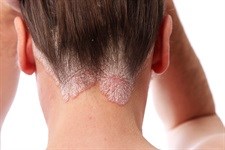Psoriasis is a chronic ailment and requires lifelong management but it can be managed if treated properly.

© Farina3000 - Fotolia.com
There are an estimated 1 million South Africans suffering from psoriasis, the inflammatory skin disease in which skin cells replicate at an extremely rapid rate. New skin cells are produced about eight times faster than normal - over several days instead of a month - but the rate at which old cells slough off is unchanged. This causes cells to build up on the skin's surface, forming thick patches of red sores (or lesions) covered with flaky, silvery-white dead skin cells which are called scales.
Worldwide, about 125 million people are affected by psoriasis - that is 2% to 3% of the world's population. Psoriasis occurs equally in males and females. Recent studies show that there may be an ethnic link. The incidence of the disease is more common in Caucasians and the highest prevalence psoriasis occurs in Scandinavia and other parts of northern Europe.
At its mildest, psoriasis can be itchy and sore. At its worst, it is painful, disfiguring and debilitating. It is very visible and unsightly but it is not contagious.
"We don't know the exact cause of psoriasis but we do know that it is not transmitted by direct or indirect contact," says Dr Mohamed Docrat, a dermatologist who specialises in the disease and runs a psoriasis treatment clinic in Cape Town.
Psoriasis has a strong genetic component but it is also thought to be an immunological condition because it occurs when the immune system sends out faulty signals that speed up the growth cycle of skin cells. A number of external factors including stress, skin injury and certain medicines trigger it.
In addition, a number of recent scientific reports have identified significant co-morbidity between psoriasis and other life-threatening diseases including diabetes mellitus, heart disease, high cholesterol, obesity and hypertension. In addition, it is estimated that about 15% of people with psoriasis also get psoriatic arthritis, which can be progressively disabling if untreated.
Depression increases
However, Sister Judy Wallace, chairperson of the South African Psoriasis Association, stresses that by far the worst component of the disease is the psychological and emotional impact on patients. "People who don't know any better see someone with psoriasis and assume that it's a symptom of HIV or even leprosy. There is a huge stigma attached and people are scared that it is contagious. As a result, many patients who suffer from this disease endure the added pain of discrimination in their communities.
"Many patients suffer in silence, they feel they can't do normal things, they cover up their bodies at all times and hide away."
In a recent study conducted by the National Psoriasis Foundation, it was revealed that patients with psoriasis have a 39% increased risk of depression, a 31% increased risk of anxiety and a 44% increased risk of suicide. Patients with severe psoriasis have a 72% increased risk of depression. As many as 60% of psoriasis patients report clinically significant psychiatric symptoms (such as depression) and may receive a psychiatric diagnosis.
The same survey found the over 80% of patients report their disease to be a moderate to large problem in their everyday life, while 25% report this disease negatively affects their job. Almost one-third report that their psoriasis interferes with their sexual activity and over 40% report experiencing social discrimination and humiliation (eg being refused service at hair or nail salons, not being permitted to use public pools, gyms or health clubs), which contributes to feelings of shame and isolation.
New treatment options
"It's heart-breaking, especially because there are treatment options that allow patients to manage the condition and live a normal life," says Wallace.
"Twenty years ago, there wasn't a lot we could do for patients with psoriasis. But today, there is a whole range of treatments that allow patients to engage in a completely normal life," adds Docrat.
In terms of treatment protocols, the South African guidelines on the management of psoriasis recommend first-line treatment by topical products. If this fails, there are several other options, including phototherapy, which involves the application of ultraviolet light to the affected areas, systemic medications that can be taken orally or by means of an injection and now even biologic drugs that are prescribed for more severe psoriasis and psoriatic arthritis that has not responded to other treatments.
"It's important to remember that while this disease is chronic and requires lifelong management, it can be managed," he says.
Wallace agrees adds too that one of the best ways to manage this disease is to join a community that understands. "The South African Psoriasis Association aims to help psoriasis sufferers in South Africa, however we can. Most importantly, it encourages people suffering from psoriasis to come out of hiding. They shouldn't have to hide anymore," she concludes.
For more information, go to www.psoriasis.org.










































